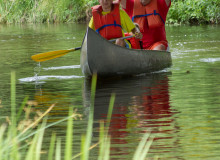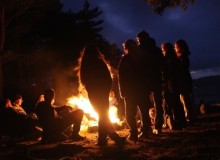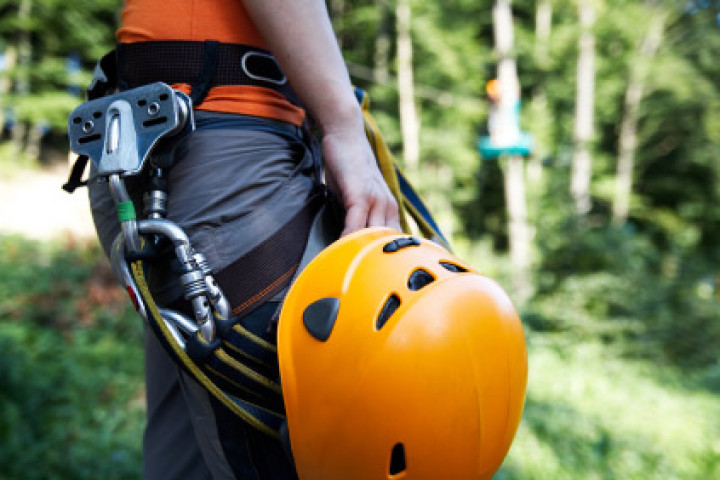I had just climbed the rock wall and was standing on the zipline platform, ready for my swift ride down the hill into an aspen grove and ending in the embrace of the cargo net.
The zipline wrangler had me step forward so he could snap the carabiner onto my safety harness. I looked over the railing at my wife, Penny, standing on the ground below, next to a climbing-wall wrangler.
I noticed Penny looking at him inquisitively just as I was given the go-ahead to leap off the platform. I didn’t slow down. I craved speed and the thrill of the ground rushing beneath my feet, the crisp air in my face, the admiring look of my young son, who was afraid to attempt the zipline at the time.
I sprinted the three steps to the edge of the platform and jumped with all my might as I clung to the T-bar above my head. My flight lasted less than a second.
Rather than sailing down the mountain side, I was rudely yanked back and deposited on my rear end on the platform, as my legs slammed into the side of the structure. What kind of zipline ride is this? I wondered.
“Oh no,” the young man at my side uttered. “I’m so sorry. I forgot to disconnect the safety line from the rock climb. Are you OK?”
“Sure, no problem,” I assured the kid, whom I liked a lot better just a moment earlier. “I’ll be fine.”
He then unhooked the rude and unneeded line from my harness, cleared me again for takeoff, and with less enthusiasm than before, I leapt from the platform. This time I was fine. All went according to plan, except for the painful bruise developing on the back of my left leg.
When I returned to where my wife was standing, she asked if I was OK. Then she gave me news I wish I hadn’t heard.
She told me that as I was preparing for my first excited leap, the young worker next to her had said, “He’s not going anywhere.”
“What do you mean?”
“Billy didn’t disconnect the safety line.”
And then I jumped.
Do you see now why I might have an even bigger issue with the guy on the ground than with the guy on the platform?
One kid made an honest mistake that caused me a little pain. It was unfortunate, but I’d always choose two safety lines to none, if you know what I mean.
But when someone sees a problem—with potential harm to a guest, even if it only causes embarrassment—and chooses not to act quickly to remedy the situation, his failure to act is at least as wrong as the problem he noticed.
It’s about a team that will cover for one another.
Not cover up mistakes, but getting each other’s back by looking for ways to make sure your partners at the ropes course or the horse barn or in the kitchen have a second set of eyes watching what they’re doing. And knowing they’re looking out for you, too.
The consequences can be much worse than a bruised leg. But the results of teamwork that truly demonstrate care for the guest, for coworkers, even for the camp’s reputation, will ensure safety and quality you’d be happy to have associated with your property.
How would you deal with this situation?





















This is an excellent reminder that caring for one another shapes our understanding of what fun is as camps and retreat centers focused primarily on the call to love one another.
Gregg,
Thanks for sharing that personal story. Without strong team focus on a common mission, and constant reminding of that focus, teams can easily get pulled off balance and focus only on their piece of the mission, or even less glorious than that, what they are getting out of what they are doing. Ministry is never a reason to take 360 degree surveillance for granted. We must be vigilant in the kitchen for guests needs, and the maintenance staff must be equally vigilant, and the AP staff as well. Then, add to that our need to scope out volunteers, donors, and each other. People who glide into ministry thinking they are on easy street should probably take the first bus out of town. 360 degree surveillance at all levels of the work, the business, and the ministry are beyond critical, they are essential. Thanks for the powerful story that objectifies just that.
Ciao!
+tom
You’ve provided an awesome example of an issue all camps face. Until every staff member understands that the care and comfort of our guests is primary to “ministering” to them, we will continue to see camps decline. We can’t always compete with resorts and hotel chains on accomodations, but the one place where we should succeed and excel is the place where we so often fail–caring for our campers and groups, making them feel not just welcome and ministered to, but cared for and special.